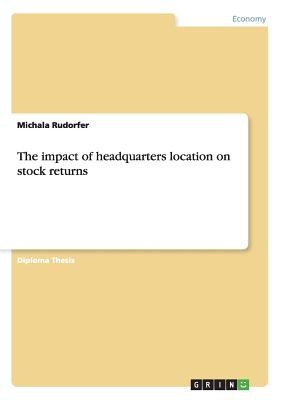
- We will send in 10–14 business days.
- Author: Michala Rudorfer
- Publisher: GRIN Verlag
- Year: 2009
- Pages: 100
- ISBN-10: 3640316622
- ISBN-13: 9783640316625
- Format: 14.8 x 21 x 0.6 cm, softcover
- Language: English
- SAVE -10% with code: EXTRA
The impact of headquarters location on stock returns (e-book) (used book) | bookbook.eu
Reviews
Description
Diploma Thesis from the year 2007 in the subject Business economics - Investment and Finance, grade: 1,0, European Business School - International University Schloà Reichartshausen Oestrich-Winkel, language: English, abstract: In a time of tremendous advances in technology, it seems striking why the location of corporate headquarters should matter for the firm's stock return. At first glance, low information and communication costs are thought to facilitate the interaction between market participants all around the world and, thus, deem the role of geographical loca-tion as marginal. This reasoning, however, does not take investors' behavior into ac-count. Even if over the past decades, international capital markets have widely been liberalized and the variety of investment opportunities across countries has grown substantially, many investors do not take the risk reduction potential of foreign assets into considera-tion. Despite the extensive benefits of international diversification, investors still over-weight domestic and local assets in their portfolios. Although this home bias has drawn much academic attention and its existence is commonly accepted, a satisfactory ration-ale could not yet be obtained. Further, the resulting economic implications for asset pricing remain unexplored. Yet, locality could be highly relevant for cost of capital cal-culation, asset allocation and performance evaluation.1 As a result, it is of crucial importance to investigate the relationship between portfolio holdings of investors and stock pricing patterns to shed light on a potential geographical component of asset pricing. The lack of academic research motivates to explore this area in greater detail. The purpose of this thesis is to fill the existing gap and establish a link between local bias and asset pricing. Therefore, a detailed overview of the home bias puzzle as well as of local asset pricing is presented. The economic impact of local bias on stock returns is empirically
EXTRA 10 % discount with code: EXTRA
The promotion ends in 11d.22:50:47
The discount code is valid when purchasing from 10 €. Discounts do not stack.
- Author: Michala Rudorfer
- Publisher: GRIN Verlag
- Year: 2009
- Pages: 100
- ISBN-10: 3640316622
- ISBN-13: 9783640316625
- Format: 14.8 x 21 x 0.6 cm, softcover
- Language: English English
Diploma Thesis from the year 2007 in the subject Business economics - Investment and Finance, grade: 1,0, European Business School - International University Schloà Reichartshausen Oestrich-Winkel, language: English, abstract: In a time of tremendous advances in technology, it seems striking why the location of corporate headquarters should matter for the firm's stock return. At first glance, low information and communication costs are thought to facilitate the interaction between market participants all around the world and, thus, deem the role of geographical loca-tion as marginal. This reasoning, however, does not take investors' behavior into ac-count. Even if over the past decades, international capital markets have widely been liberalized and the variety of investment opportunities across countries has grown substantially, many investors do not take the risk reduction potential of foreign assets into considera-tion. Despite the extensive benefits of international diversification, investors still over-weight domestic and local assets in their portfolios. Although this home bias has drawn much academic attention and its existence is commonly accepted, a satisfactory ration-ale could not yet be obtained. Further, the resulting economic implications for asset pricing remain unexplored. Yet, locality could be highly relevant for cost of capital cal-culation, asset allocation and performance evaluation.1 As a result, it is of crucial importance to investigate the relationship between portfolio holdings of investors and stock pricing patterns to shed light on a potential geographical component of asset pricing. The lack of academic research motivates to explore this area in greater detail. The purpose of this thesis is to fill the existing gap and establish a link between local bias and asset pricing. Therefore, a detailed overview of the home bias puzzle as well as of local asset pricing is presented. The economic impact of local bias on stock returns is empirically


Reviews